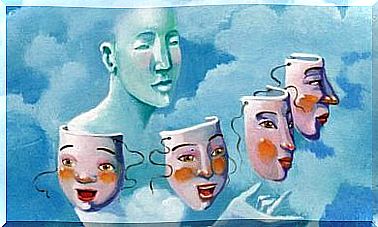The Relationship Between Sleep And Chronic Pain

In today’s article, we’re going to talk about the relationship between sleep and chronic pain. Chronic pain, for example, affects about 25% of the population in Spain.
In a study of 5,000 participants, 43% reported experiencing pain in the past week, especially in the legs, back or head. About 54% of them said they experienced long-term, chronic discomfort that had a significant negative impact on their lives.
The most common causes of chronic pain are arthritis, rheumatism and migraines. More than 60% of patients said they use painkillers to deal with their pain. However, these drugs can have many different side effects with long-term use, including conditions that can make the pain worse.

The Effects of Chronic Pain
If you suffer from chronic pain, you know the negative impact it can have on people’s lives. Being in physical pain all the time also causes significant psychological distress. Some of the things chronic pain affects the most include the following:
- sleep
- Social life
- Cognitive skills
- Fysical activity
- Work performance
- Various daily activities (shopping, cooking, driving, writing, etc.)
Chronic pain also leads to a higher risk of mental disorders such as anxiety and depression. Unfortunately, this kind of long-term pain can also lead to chronic stress.
Sleep and chronic pain
A patient’s sleep quality is considered a fundamental variable in determining whether a treatment strategy for chronic pain is working or not.
About 50 to 70 percent of patients with moderate or intense chronic pain have some kind of sleep disorder. This is especially true for older adults. The most common conditions are the following:
- Difficulty falling asleep.
- Waking up in the middle of the night because of the pain.
- Non-restful sleep.
- Daytime sleepiness.
Pain makes it very difficult for these patients to get a good night’s sleep. This, in turn, causes hyperalgesia, which is a heightened perception for pain. Being more sensitive to pain then makes it harder to sleep. This eventually creates a vicious circle that is difficult to break.
How Painkillers Affect Sleep
Pharmaceutical drugs prescribed for chronic pain can help with symptoms, but they also affect sleep quality. Here are some of the most commonly used:
Non-Steroidal Anti-Inflammatory Drugs (NSAIDs)
These are some of the most commonly used pain relievers for adults. Not only do they reduce inflammation, but they also lower fever, swelling, and redness. Doctors prescribe them for chronic health conditions such as arthritis or lupus.
Unfortunately, NSAIDs also decrease sleep efficiency and increase wakefulness at night. Here are the three main reasons why that might happen:
- A decrease in the production of prostaglandins.
- They disrupt the release of melatonin.
- Stomach irritation from prolonged use.
Opioids
This is a safe option only under the strict supervision of a doctor for a short period of time. Long-term use causes dependence. If you do not take them correctly, you can overdose and even die.
Therefore, doctors prescribe them carefully. Opioids reduce REM sleep and the slow wave sleep cycle. However, both are essential for the proper physiological development of sleep cycles.
Corticoids
Doctors mainly prescribe corticoids to reduce inflammation in conditions such as arthritis, asthma, lupus, multiple sclerosis, and certain types of cancer.
Long-term use can weaken bones or cause cataracts, among other things. That’s why doctors usually only prescribe them for a short time.
How do they affect sleep? High doses work just like opioids. They reduce rapid eye movements and slow sleep waves.

Sleep and Chronic Pain: Conclusions
Scientific literature points to a direct relationship between chronic pain and sleep disorders. Pain makes it difficult to get a good night’s sleep and sleep deprivation increases pain perception.
It is important to remember that multiple factors affect sleep. Age plays an important role, as does the medications you take. However, it is important not to exclude other related pathologies or external conditions that interfere with a good night’s sleep and increase sensitivity to pain.
If you’re taking pain medications for chronic pain, it’s a good idea to replace accelerated-release drugs with extended-release drugs. Studies show (Spanish link) that the latter can reduce the incidence of sleep disorders associated with painkillers.









